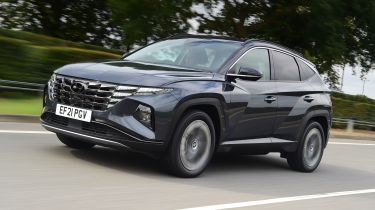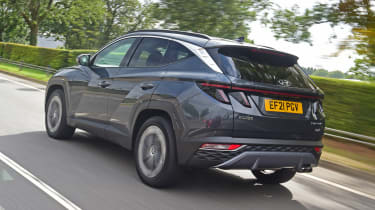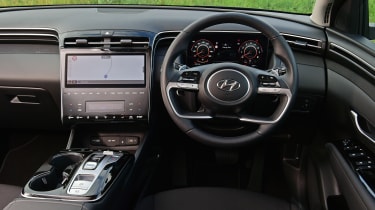New Hyundai Tucson PHEV 2022 review
Is the award-winning Hyundai Tucson even better with plug-in hybrid power?

Verdict
If you’re after an efficient plug-in hybrid family SUV, then you won’t go far wrong with Hyundai’s Tucson PHEV. However, we think that the regular hybrid model is still the better bet, because it’s more affordable. Still, both cars share the same spacious and premium-feeling cabin, impressive in-car technology and refined road manners, which are heightened even further around town in this car’s electric mode. Performance is fine but the efficiency heights are even greater – just remember to plug in to maximise fuel economy.
When the Hyundai Tucson made its debut in hybrid form it shot straight to the top of the family SUV sector, taking victory in its class at the 2021 Auto Express New Car Awards. This is our first taste of the plug-in hybrid model, which promises more electrification for even stronger efficiency thanks to a larger 13.8kWh battery that allows for a claimed pure-electric range of up to 38 miles.
Of course, you pay for that extra capability, because our Tucson Plug-in Hybrid in mid-spec Premium trim comes in at £39,330 – £4,670 more than the regular hybrid model in the same specification.
The powertrain comprises the same 1.6-litre turbocharged four-cylinder petrol engine as the regular hybrid, but the bigger battery feeds a more powerful electric motor for a total of 261bhp and 350Nm, which means 0-62mph in 8.6 seconds. This is slightly slower than the regular hybrid, but as with any car with a serious element of electrification, flat-out performance isn’t the key. Instead, it’s about the ‘fill’ the electric motor adds, and with torque available instantly the step-off acceleration from a standstill is swift in the Tucson.
Used - available now

2023 Hyundai
Tucson
29,517 milesManualPetrol1.6L
Cash £19,487
2023 Hyundai
Tucson
40,000 milesAutomaticPetrol1.6L
Cash £21,995
2020 Hyundai
Tucson
29,213 milesAutomaticPetrol1.6L
Cash £14,800
2023 Hyundai
Tucson
55,269 milesAutomaticPetrol1.6L
Cash £19,587It surges forward with a willingness that no pure-ICE car like this can match, and there’s no flaring of revs as the gearbox handles the transmission of power to the road, so the Tucson is also really relaxing around town. The ride backs this up, because even on our car’s 19-inch wheels, the composed suspension set-up soaks up the kind of scars UK urban roads throw at it in an impressively unruffled manner.
With light steering the Hyundai is easy to manoeuvre in this environment, too, and on more open roads the comfort also helps. But it’s not the most dynamic machine; the Tucson PHEV’s preferred groove is relaxed cruising, because the engine gets a little noisy if you ask for some hard acceleration.
That will also dent the claimed efficiency figures of 201.8mpg and 31g/km of CO2 emissions, and while you might not get close to that (remember to plug in as frequently as possible to minimise running costs) the Tucson PHEV should be an extremely affordable family SUV to run. Even more so if you’re a company car driver, because an 11 per cent Benefit-in-Kind taxation rate is favourable compared with similar ICE-powered models in this class.
When it comes to practicality there’s no compromise inside, with the same great level of room in the rear that made the Tucson such a hit when we first drove it. The dash design gives a feeling of space in the front, too, and it’s constructed from (mostly) premium materials and features plenty of advanced technology, including the infotainment.
At 558 litres, the Tucson PHEV’s boot is down on the 616-litre capacity of the hybrid version due to the packaging requirements of its larger battery. Yet there’s still more than enough space; for reference, the new Nissan Qashqai offers 504 litres, which is perfectly adequate.
Practicality with a plug-in hybrid also extends to topping up, but with a 7.2kW on-board charger, even with a relatively chunky battery for a mid-size PHEV SUV, a charge time of one hour and 42 minutes means there’s plenty of flexibility on offer here. Our tests showed it was easy to achieve 30 miles of pure-EV driving with the plug-in version, too.
However, in Premium trim the Tucson PHEV is relatively pricey, at £39,330, although it comes well equipped, offering 18-inch alloy wheels, climate control, high-beam assist, smart adaptive cruise control, all-round parking sensors with a rear-view camera, full keyless go, heated seats and a heated steering wheel. It also has a 10.25-inch digital dash and a central touchscreen infotainment system of the same size.
It’s a great set-up that boasts sharp graphics and quick responses, plus with Android Auto and Apple CarPlay, and wireless charging, there’s plenty of connectivity and technology on offer.
Safety tech is great, too, with lane follow and lane-keep assist, along with autonomous emergency braking featuring pedestrian and cyclist detection, rear cross- traffic assist and many more protective systems are all fitted as standard.
| Model: | Hyundai Tucson 1.6 T-GDi PHEV Premium |
| Price: | £39,330 |
| Engine: | 1.6-litre 4cyl turbo petrol PHEV |
| Power/torque: | 261bhp/350Nm |
| Transmission: | Six-speed automatic, four-wheel drive |
| 0-62mph: | 8.6 seconds |
| Top speed: | 118mph |
| Economy/CO2: | 201.8mpg/31g/km |
| EV range: | 38 miles |
| On sale | Now |











